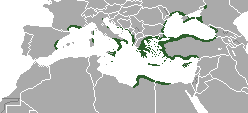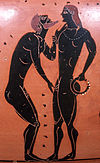
Portal:Ancient Greece
|
edit
The Ancient Greece Portal
The term ancient Greece refers to the periods of Greek history in Classical Antiquity, lasting ca. 750 BC (the archaic period) to 146 BC (the Roman conquest). It is generally considered to be the seminal culture which provided the foundation of Western Civilization. Greek culture had a powerful influence on the Roman Empire, which carried a version of it to many parts of Europe. The civilization of the ancient Greeks has been immensely influential on the language, politics, educational systems, philosophy, science, and arts, giving rise to the Renaissance in Western Europe and again resurgent during various neo-Classical revivals in 18th and 19th century Europe and the Americas.There are no fixed or universally agreed upon dates for the beginning or the end of the ancient Greek period. In common usage it refers to all Greek history before the Roman Empire, but historians use the term more precisely. Some writers include the periods of the Greek-speaking Mycenaean civilization that collapsed about 1150 BC, though most would argue that the influential Minoan was so different from later Greek cultures that it should be classed separately.
edit
Selected articleGreek pederasty, as idealised by the Greeks from archaic times onward, was a relationship and bond between an adolescent boy and an adult man outside of his immediate family, and was constructed initially as an aristocratic moral and educational institution. As such, it was seen by the Greeks as an essential element in their culture from the time of Homer onwards.The ancient Greeks were the first to describe, study, systematize, and establish pederasty as an institution. The origin of that tradition has been variously explained. One school of thought, articulated by Bernard Sergent, holds that the Greek pederastic model evolved from far older Indo-European rites of passage, which were grounded in a shamanic tradition with roots in the Neolithic. Foucault declared that pederasty was "problematized" in Greek culture, that it was "the object of a special — and especially intense — moral preoccupation" focusing on concern with the chastity/moderation of the erōmenos (the term used for the "beloved" youth). More...
edit
Selected locationPergamon or Pergamum (Greek: Πέργαμος, modern day Bergama in Turkey, 39°7′N 27°11′E) was an ancient Greek city, in Mysia, north-western Anatolia, 16 miles from the Aegean Sea, located on a promontory on the north side of the river Caicus (modern day Bakırçay), that became an important kingdom during the Hellenistic period, under the Attalid dynasty, 281– 133 BC. More...
edit
Did you know...
edit
Selected picturePhoto credit: Marsyas One of the Pitsa panels, the only surviving panel paintings from Archaic Greece. The most respected form of art, according to authors like Pliny or Pausanias, were individual, mobile paintings on wooden boards, technically described as panel paintings. edit
Selected biographyThrasybulus (Ancient Greek: Θρασύβουλος, brave-willed, Eng. /θræsɪ'bju:ləs/; d. 388 BC) was an Athenian general and democratic leader. In 411 BC, in the wake of an oligarchic coup at Athens, the pro-democracy sailors at Samos elected him as a general, making him a primary leader of the successful democratic resistance to that coup. As general, he was responsible for recalling the controversial nobleman Alcibiades from exile, and the two worked together extensively over the next several years. In 411 and 410, Thrasybulus commanded along with Alcibiades and others at several critical Athenian naval victories.After Athens' defeat in the Peloponnesian War, Thrasybulus led the democratic resistance to the new oligarchic government, known as the Thirty Tyrants, that the victorious Spartans imposed on Athens. In 404 BC, he commanded a small force of exiles that invaded Attica and, in successive battles, defeated first a Spartan garrison and then the forces of the oligarchy.
|






